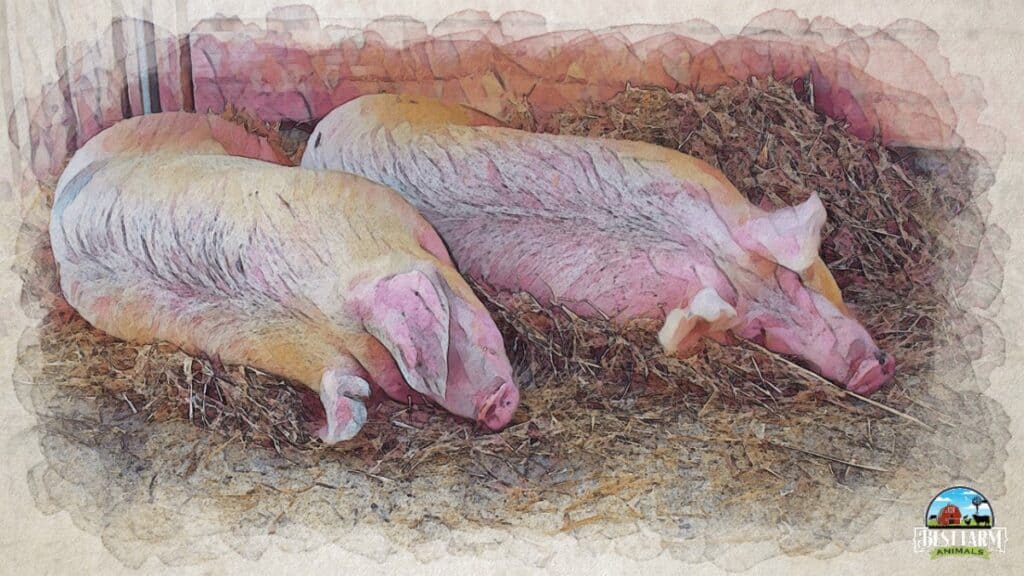Leptospirosis: Reproductive Illness (Zoonotic)
Leptospirosis is a common bacterial disease that causes abortions, stillbirths, and reproductive issues in pigs. It is caused by spirochaetes (a group of spiral-shaped bacteria). Leptospirosis occurs mainly in adult pigs. Sadly within 1 to 4 weeks after infection with the bacteria, a pig can experience abortion or the birth of weak piglets that die soon after birth.
Pregnant sows are at high risk for this disease. The bacteria enter the body through the pig’s mucous membranes and cause infection within the uterus.
Pig Leptospirosis is zoonotic, which means it can spread to humans, domestic animals, and wildlife. It causes serious diseases such as Lyme disease and syphilis in humans (study below). It can also cause symptoms similar to the flu: fever, headaches, sore muscles, chills, and vomiting. So take extreme care to handle infected pigs with gloves and wash your hands immediately!
Causes of Leptospirosis
Infected or carrier pigs shed the organisms in their urine, which can spread quickly to the rest of the herd. Leptospirosis spreads through contaminated food or water.
Humans are infected by consuming uncooked pork products, drinking contaminated water, or handling carrier pigs. The bacteria spread through the air from the urine droplets of infected pigs. So cover your nose and mouth with an N95 mask when working with ill pigs.
Symptoms of Leptospirosis
If your pig is infected, it will show signs of anorexia, fever, and lack of energy. If your piglets are infected, they show signs of jaundice (although it is rare for piglets to be infected).
If your pigs are experiencing stillbirth or giving birth to weak piglets (also known as squeakers), they may be infected. Symptoms of Leptospirosis in Pigs include:
- Stillbirths
- Weak piglets
- Loss of appetite
- Mild diarrhea
- Weight loss
Treating Leptospirosis
Administer oral antibiotics as soon as possible to prevent further spread of the bacteria. Blood transfusions may also be necessary in severe cases.
Have your pigs vaccinated with a multivalent bacterin (such as Lepto-Eryvac) every six months as a preventative? Make sure there are no rats in your pig’s living environment, as they are also carriers of this disease. Secure pig feeds to prevent attracting rats.
Ensure your pigs have access to clean water. Disinfect the pigs living area regularly with products that contain sodium hypochlorite. Unfortunately, no confirmed safe vaccine is available for humans yet, so preventing human infection is vital.
References
National Library of Medicine Leptospirosis: The “mysterious” mimic
Queensland Government Leptospirosis in pigs
My Most Used Pig Supplies
This list contains affiliate products. Affiliate products do not cost more but helps to support BestFarmAnimals and our goal to provide farm animal owners with accurate and helpful information.
Purina Pig Chow will last well (or Mazuri is popular, but I haven’t tried it), and the stainless steel non-skid bowls that will help keep the mess down.
A pig blanket to keep her warm. This one also has bright colors and helps to provide rooting without the destruction.
Pig Harness for walking and handling your pig. There are a lot to choose from, but this one is pretty easy to use. If you want one that has a separate leash, this looks like a good one.
A large crate for keeping her safe in your house at night and when you leave the house. This is essential. You’ll also want a litterbox, and I like mine with a lid for nighttime. Pine shavings are best, and you may be able to find them in larger quantities locally.
When you have accidents, Odoban will help eliminate odors. When you are potty training, these floor pads work great for keeping your house clean while training her to go in certain places.
You’ll also want an outdoor house to keep her warm when she gets outside time, an essential part of her development.
Dewormer- Ivermectin is the primary dewormer I use, although I do rotate with a non-ivermect ingredient once so that the worms don’t get immune to it.

